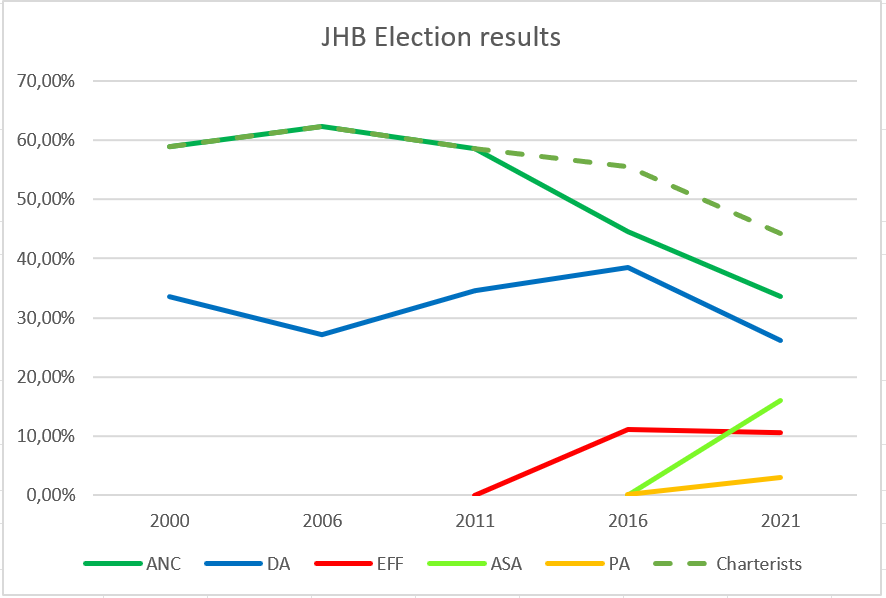The sad truth is, the DA have hit a ceiling, and have passed their peak.
They aren’t the only party losing support, as we well know - the ANC have been on a steady decline for years now. The voting population has been staying away from the polls in greater proportions with each election. The ANC and the EFF have both seen their support fall in recent months, in a way that is outside their usual envelope.
But the DA aren’t getting the growth they so optimistically project in social media posts and public speeches. The only reason the DA has been successful in the face of their stagnation and demographic change, is that blacks abstain from the ballot at far higher rates than whites (unfortunately, I got this from an unpublished study I saw, so you’re going to have to trust me).
But the causes of the Liberal party’s woes are all too obvious, and they should really have seen it coming.
In the last post, I put forth evidence for the proposition that South Africa votes almost statically, along racial lines; black people vote ANC/EFF, Some Zulus vote IFP, most minorities vote DA (or previously the NP), all in rather stable proportions.
Now, the DA did manage to win a fair amount of black support in a few places, most notably in Gauteng, where they looked ready to break through the 25% minority demo ceiling for good.
But to hold onto power here, they had to effect change, and that was not as easy as it looked. There are a lot of convoluted soap-opera vignettes in the whole saga, but essentially, they didn’t get rid of ANC cadres in the civil service, so they were stuck with parasites, idiots and saboteurs. That meant that all the big attempts at reform were massively frustrated, and few citizens got to see real tangible and undeniable change.
Then, they showed that they struggled to work together. They treated their coalition partners as outsiders and underlings, and couldn’t stop micromanaging Herman Mashaba. HM is of course not an experienced politician, and his short record isn’t exactly squeaky clean, but the tight control the party executive places over their appointments makes creative and nimble strategy difficult unless it moves leftward, and is therefore safe for media consumption.
Herman Mashaba breaking away attracted a lot of DA talent who were sick of this micromanagement, and some who were just sick of the sleeze - John Steenhuisen snaking the wife of Michael Beaumont has turned into one of the longest one-sided political feuds in recent memory.
But this beef isn’t the only reason coalitions failed. The DA by all accounts has been utterly intransigent, and insists on dictating terms, regardless of whether other smaller parties are willing to put up with it. The consequence is chaos, and loss of control of the cities.
They aren’t entirely to blame however - the horse-trading that goes on can be very seedy, and smaller parties are often very mercantile and easy to bribe to switch sides. This is something the DA should have learned from Nelson Mandela Bay - the story that demonstrates that the rise of Action SA can’t be blamed for the drop in support.
This is a general trend - the chaos and paralysis of coalition politics, and the DA’s inability to negotiate their way through it (Zille once said in an interview that they were manipulated, but saying you can’t outmaneuver your opponent isn’t a valid complaint in politics).
This coalition effect is visible in every DA-minority metro so far: Nelson Mandela Bay, Johannesburg, Pretoria/Tshwane, and Ekurhuleni.
Rather than incorporate these newcomers into a grand coalition that can act as a bulwark against the ANC, the DA have spent a lot of time bashing their erstwhile allies, and made themselves look simultaneously childish and authoritarian - entitled to rule.
They have done a bit to remedy this, now pushing the “Moonshot Pact” for a grand anti-Charterist coalition in 2024, but for a good year or two, they let all their frustrations with coalition politics spill out in public, and spent a lot of time bashing these allies while openly calling for a coalition with the ANC, which did horrors to their support, hence the pivot.
But the big lesson the public took away from the metro fiascos is that there’s no real difference between one party and another. Voter turnout is lower than ever. And this means that those who vote are reduced ever-more to those motivated by loyalty, specifically ethnic loyalty.
Divisions are going to deepen.
In the next post, I will explain why the minority base is splitting, and what that means for the Western Cape, which is the only place lasting change seems possible, however narrow the window.








